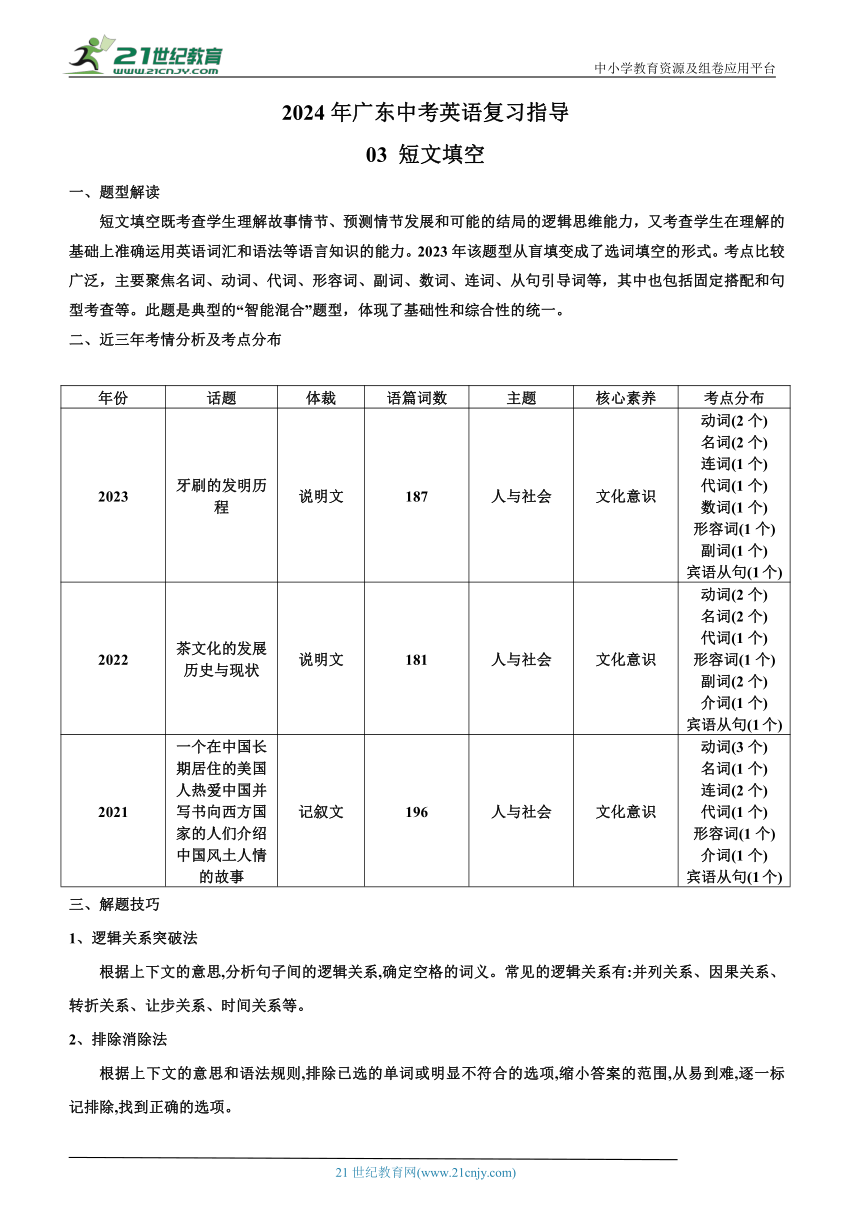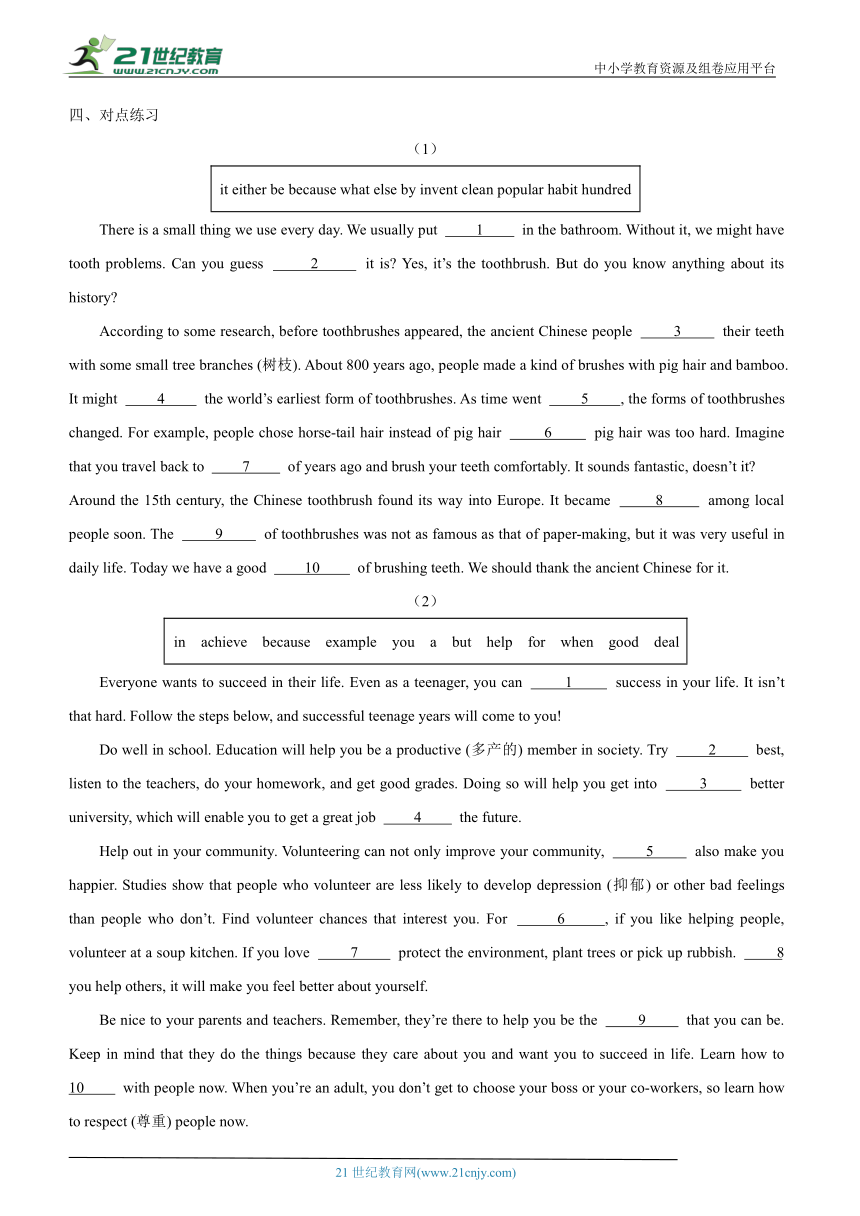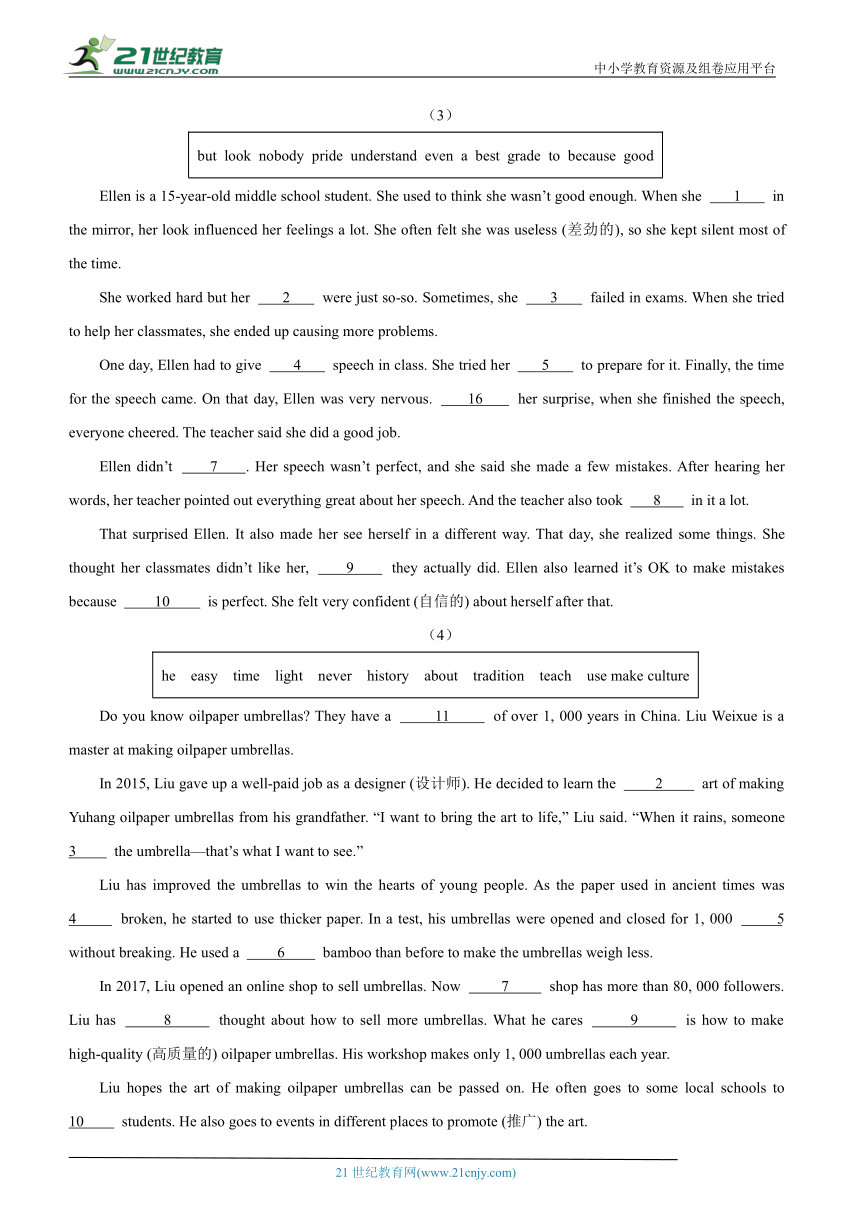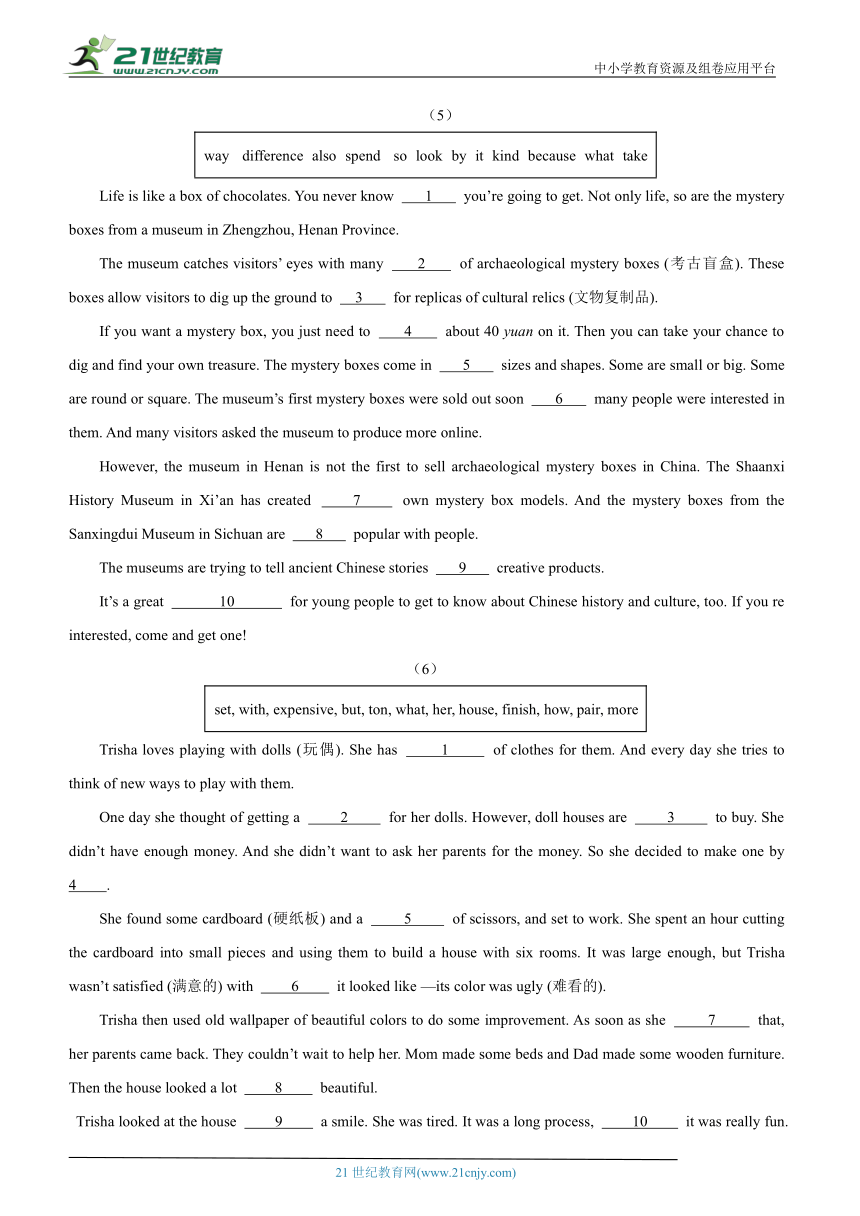03 短文填空(含答案解析)---2024年广东中考英语复习指导
文档属性
| 名称 | 03 短文填空(含答案解析)---2024年广东中考英语复习指导 |  | |
| 格式 | doc | ||
| 文件大小 | 195.8KB | ||
| 资源类型 | 试卷 | ||
| 版本资源 | 人教新目标(Go for it)版 | ||
| 科目 | 英语 | ||
| 更新时间 | 2024-05-03 23:10:01 | ||
图片预览




文档简介
中小学教育资源及组卷应用平台
2024年广东中考英语复习指导
03 短文填空
一、题型解读
短文填空既考查学生理解故事情节、预测情节发展和可能的结局的逻辑思维能力,又考查学生在理解的基础上准确运用英语词汇和语法等语言知识的能力。2023年该题型从盲填变成了选词填空的形式。考点比较广泛,主要聚焦名词、动词、代词、形容词、副词、数词、连词、从句引导词等,其中也包括固定搭配和句型考查等。此题是典型的“智能混合”题型,体现了基础性和综合性的统一。
二、近三年考情分析及考点分布
年份 话题 体裁 语篇词数 主题 核心素养 考点分布
2023 牙刷的发明历程 说明文 187 人与社会 文化意识 动词(2个)名词(2个)连词(1个)代词(1个)数词(1个)形容词(1个)副词(1个)宾语从句(1个)
2022 茶文化的发展历史与现状 说明文 181 人与社会 文化意识 动词(2个)名词(2个)代词(1个)形容词(1个)副词(2个)介词(1个)宾语从句(1个)
2021 一个在中国长期居住的美国人热爱中国并写书向西方国家的人们介绍中国风土人情的故事 记叙文 196 人与社会 文化意识 动词(3个)名词(1个)连词(2个)代词(1个)形容词(1个)介词(1个)宾语从句(1个)
解题技巧
1、逻辑关系突破法
根据上下文的意思,分析句子间的逻辑关系,确定空格的词义。常见的逻辑关系有:并列关系、因果关系、转折关系、让步关系、时间关系等。
2、排除消除法
根据上下文的意思和语法规则,排除已选的单词或明显不符合的选项,缩小答案的范围,从易到难,逐一标记排除,找到正确的选项。
对点练习
(1)
it either be because what else by invent clean popular habit hundred
There is a small thing we use every day. We usually put 1 in the bathroom. Without it, we might have tooth problems. Can you guess 2 it is Yes, it’s the toothbrush. But do you know anything about its history
According to some research, before toothbrushes appeared, the ancient Chinese people 3 their teeth with some small tree branches (树枝). About 800 years ago, people made a kind of brushes with pig hair and bamboo. It might 4 the world’s earliest form of toothbrushes. As time went 5 , the forms of toothbrushes changed. For example, people chose horse-tail hair instead of pig hair 6 pig hair was too hard. Imagine that you travel back to 7 of years ago and brush your teeth comfortably. It sounds fantastic, doesn’t it
Around the 15th century, the Chinese toothbrush found its way into Europe. It became 8 among local people soon. The 9 of toothbrushes was not as famous as that of paper-making, but it was very useful in daily life. Today we have a good 10 of brushing teeth. We should thank the ancient Chinese for it.
(2)
in achieve because example you a but help for when good deal
Everyone wants to succeed in their life. Even as a teenager, you can 1 success in your life. It isn’t that hard. Follow the steps below, and successful teenage years will come to you!
Do well in school. Education will help you be a productive (多产的) member in society. Try 2 best, listen to the teachers, do your homework, and get good grades. Doing so will help you get into 3 better university, which will enable you to get a great job 4 the future.
Help out in your community. Volunteering can not only improve your community, 5 also make you happier. Studies show that people who volunteer are less likely to develop depression (抑郁) or other bad feelings than people who don’t. Find volunteer chances that interest you. For 6 , if you like helping people, volunteer at a soup kitchen. If you love 7 protect the environment, plant trees or pick up rubbish. 8 you help others, it will make you feel better about yourself.
Be nice to your parents and teachers. Remember, they’re there to help you be the 9 that you can be. Keep in mind that they do the things because they care about you and want you to succeed in life. Learn how to 10 with people now. When you’re an adult, you don’t get to choose your boss or your co-workers, so learn how to respect (尊重) people now.
(3)
but look nobody pride understand even a best grade to because good
Ellen is a 15-year-old middle school student. She used to think she wasn’t good enough. When she 1 in the mirror, her look influenced her feelings a lot. She often felt she was useless (差劲的), so she kept silent most of the time.
She worked hard but her 2 were just so-so. Sometimes, she 3 failed in exams. When she tried to help her classmates, she ended up causing more problems.
One day, Ellen had to give 4 speech in class. She tried her 5 to prepare for it. Finally, the time for the speech came. On that day, Ellen was very nervous. 16 her surprise, when she finished the speech, everyone cheered. The teacher said she did a good job.
Ellen didn’t 7 . Her speech wasn’t perfect, and she said she made a few mistakes. After hearing her words, her teacher pointed out everything great about her speech. And the teacher also took 8 in it a lot.
That surprised Ellen. It also made her see herself in a different way. That day, she realized some things. She thought her classmates didn’t like her, 9 they actually did. Ellen also learned it’s OK to make mistakes because 10 is perfect. She felt very confident (自信的) about herself after that.
(4)
he easy time light never history about tradition teach use make culture
Do you know oilpaper umbrellas They have a 11 of over 1, 000 years in China. Liu Weixue is a master at making oilpaper umbrellas.
In 2015, Liu gave up a well-paid job as a designer (设计师). He decided to learn the 2 art of making Yuhang oilpaper umbrellas from his grandfather. “I want to bring the art to life,” Liu said. “When it rains, someone 3 the umbrella—that’s what I want to see.”
Liu has improved the umbrellas to win the hearts of young people. As the paper used in ancient times was 4 broken, he started to use thicker paper. In a test, his umbrellas were opened and closed for 1, 000 5 without breaking. He used a 6 bamboo than before to make the umbrellas weigh less.
In 2017, Liu opened an online shop to sell umbrellas. Now 7 shop has more than 80, 000 followers. Liu has 8 thought about how to sell more umbrellas. What he cares 9 is how to make high-quality (高质量的) oilpaper umbrellas. His workshop makes only 1, 000 umbrellas each year.
Liu hopes the art of making oilpaper umbrellas can be passed on. He often goes to some local schools to 10 students. He also goes to events in different places to promote (推广) the art.
(5)
way difference also spend so look by it kind because what take
Life is like a box of chocolates. You never know 1 you’re going to get. Not only life, so are the mystery boxes from a museum in Zhengzhou, Henan Province.
The museum catches visitors’ eyes with many 2 of archaeological mystery boxes (考古盲盒). These boxes allow visitors to dig up the ground to 3 for replicas of cultural relics (文物复制品).
If you want a mystery box, you just need to 4 about 40 yuan on it. Then you can take your chance to dig and find your own treasure. The mystery boxes come in 5 sizes and shapes. Some are small or big. Some are round or square. The museum’s first mystery boxes were sold out soon 6 many people were interested in them. And many visitors asked the museum to produce more online.
However, the museum in Henan is not the first to sell archaeological mystery boxes in China. The Shaanxi History Museum in Xi’an has created 7 own mystery box models. And the mystery boxes from the Sanxingdui Museum in Sichuan are 8 popular with people.
The museums are trying to tell ancient Chinese stories 9 creative products.
It’s a great 10 for young people to get to know about Chinese history and culture, too. If you re interested, come and get one!
(6)
set, with, expensive, but, ton, what, her, house, finish, how, pair, more
Trisha loves playing with dolls (玩偶). She has 1 of clothes for them. And every day she tries to think of new ways to play with them.
One day she thought of getting a 2 for her dolls. However, doll houses are 3 to buy. She didn’t have enough money. And she didn’t want to ask her parents for the money. So she decided to make one by 4 .
She found some cardboard (硬纸板) and a 5 of scissors, and set to work. She spent an hour cutting the cardboard into small pieces and using them to build a house with six rooms. It was large enough, but Trisha wasn’t satisfied (满意的) with 6 it looked like —its color was ugly (难看的).
Trisha then used old wallpaper of beautiful colors to do some improvement. As soon as she 7 that, her parents came back. They couldn’t wait to help her. Mom made some beds and Dad made some wooden furniture. Then the house looked a lot 8 beautiful.
Trisha looked at the house 9 a smile. She was tired. It was a long process, 10 it was really fun. She finally found something new for her dolls, and she felt it great to make something herself.
答案详解:
(1)
1.it 2.what 3.cleaned 4.be 5.by 6.because 7.hundreds 8.popular 9.invention 10.habit
【导语】本文介绍了牙刷的历史和功能。
1.句意:我们通常把它放在浴室里。指代前文“a small thing”,需用代词it。故填it。
2.句意:你能猜出它是什么吗?根据“Can you guess...it is ”可知是询问猜出它是什么。what“什么”。故填what。
3.句意:根据一些研究,在牙刷出现之前,中国古人用一些小树枝清洁牙齿。根据“before toothbrushes appeared, the ancient Chinese people...their teeth...”可知没有牙刷,古人会用树枝清洁牙齿。clean the teeth表示“清理牙齿”;句子是一般过去时,动词需用过去式。故填cleaned。
4.句意:这可能是世界上最早的牙刷。此处是系表结构,情态动词might后跟be动词原形。故填be。
5.句意:随着时间的推移,牙刷的形状也发生了变化。As time went by“随着时间的流逝”。故填by。
6.句意:例如,人们选择马尾毛而不是猪毛,因为猪毛太硬了。前后句之间是因果关系,前果后因,用because表示“因为”。故填because。
7.句意:想象一下,你回到几百年前,舒舒服服地刷牙。根据“About 800 years ago”可知此处是hundreds of短语,表示“数以百计的”。故填hundreds。
8.句意:它开始流行起来。根据“It became...among local people soon.”可知空处需填入形容词作表语,popular“受欢迎的”符合语境。故填popular。
9.句意:牙刷的发明不像造纸术那样出名,但在日常生活中非常有用。根据“The...of toothbrushes”可知是指牙刷的发明。invention“发明”。故填invention。
10.句意:今天我们养成了刷牙的好习惯。根据“Today we have a good...of brushing teeth.”可知刷牙是好习惯。have a good habit of“有一个……好习惯”。故填habit。
(2)
1.achieve 2.your 3.a 4.in 5.but 6.example 7.helping 8.When 9.best 10.deal
【导语】本文讲述了如何拥有一个成功的青少年生活。
1.句意:即使作为青少年,你也可以在生活中取得成功。根据“Follow the steps below, and successful teenage years will come to you!”可知后文在介绍成功的建议,因此此处表示achieve success“取得成功”,空前是情态动词can,后接动词原形。故填achieve。
2.句意:尽你最大的努力,听老师的话,做作业,取得好成绩。根据“do your homework”可知此空对象是“你”,try one’s best“尽某人最大的努力”,因此为形容词性物主代词your。故填your。
3.句意:这样做将帮助你进入一所更好的大学,这将使你在未来找到一份好工作。此空需用不定冠词表泛指,better是以辅音音素开头的单词,此空需用a。故填a。
4.句意:这样做将帮助你进入一所更好的大学,这将使你在未来找到一份好工作。in the future“在未来”,故填in。
5.句意:志愿服务不仅可以改善你的社区,还可以让你更快乐。not only…but also“不仅……而且”,故填but。
6.句意:举个例子,如果你喜欢帮助别人,就在施粥处当志愿者。根据“if you like helping people, volunteer at a soup kitchen.”可知是举的例子,for example“举例”,故填example。
7.句意:如果你喜欢帮助保护环境,那就种树或捡垃圾。根据“protect the environment, plant trees or pick up rubbish.”可知是如果你喜欢帮助保护环境,love doing sth.“喜欢做某事”,因此help“帮助”用动名词形式。故填helping。
8.句意:当你帮助别人时,它会让你对自己感觉更好。根据“you help others, it will make you feel better about yourself.”可知是当你帮助别人时,它会让你对自己感觉更好。when“当”,故填When。
9.句意:记住,他们会帮助你做到最好。根据“they’re there to help you be the”可知是指父母和老师会帮助你更好,good“好”,空前有the,因此用最高级best。故填best。
10.句意:现在就学习如何与人相处。deal with“应对”,不定式to后接动词原形。故填deal。
(3)
1.looked 2.grades 3.even 4.a 5.best 6.Τo 7.understand 8.pride 9.but 10.nobody
【导语】本文主要讲述了艾伦曾经认为自己不够好,成绩一般。后来认识到人无完人,改变自己的故事。
1.句意:当她照镜子时,她的表情对她的感情影响很大。此空应填谓语动词,结合“in the mirror”可知,是指照镜子,应用look in the mirror,句子是一般过去时,动词用过去式,故填looked。
2.句意:她学习很努力,但成绩一般。根据“She worked hard but her...were just so-so.”可知,虽然很努力,但是成绩一般般,应用grade“成绩”,结合were可知,应用复数,故填grades。
3.句意:有时,她甚至考试不及格。根据“Sometimes, she...failed in exams.”结合选词可知,艾伦有时候考试甚至不及格,even“甚至”符合语境,故填even。
4.句意:一天,艾伦要在课堂上演讲。give a speech“做演讲”,为固定短语,故填a。
15.句意:她尽了最大的努力准备。try one’s best to do“尽某人最大的努力做”,为固定短语,故填best。
6.句意:令她吃惊的是,当她结束演讲时,每个人都欢呼起来。to one’s surprise“令人某人惊讶的是”,为固定短语,故填To。
7.句意:艾伦不明白。助动词后跟动词原形,结合“Her speech wasn’t perfect, and she said she made a few mistakes”和选词可知,understand“明白”符合语境,故填understand。
8.句意:老师也为此感到非常自豪。take pride in“为……自豪”,为固定短语,故填pride。
9.句意:她以为她的同学不喜欢她,但实际上他们喜欢她。分析题干可知,前后句是转折关系,应用but连接,故填but。
10.句意:艾伦还学会了犯错没关系,因为人无完人。根据“Ellen also learned it’s OK to make mistakes because...is perfect.”可知,没有人是完美的,应用nobody,故填nobody。
(4)
1.history 2.traditional 3.uses 4.easily 5.times 6.lighter 7.his 8.never 9.about 10.teach
【导语】本文主要讲述了刘伟学为制作油纸伞所做的事情,因为他希望制作油纸伞可以被传承。
1.句意:它们在中国有一千多年的历史。根据“They have a ... of over 1, 000 years in China.”可知是有一千多年的历史,备选词history“历史”符合,a修饰名词单数。故填history。
2.句意:他决定向祖父学习制作余杭油纸伞的传统技艺。根据“the ... art of making Yuhang oilpaper umbrellas”可知是指制作余杭油纸伞的传统技艺,备选词tradition“传统”符合,此处应用形容词traditional“传统的”修饰名词art。故填traditional。
3.句意:下雨时,有人用油纸伞——这就是我想看到的。根据“When it rains”可知下雨时要用伞,备选词use“使用”符合,时态为一般现在时,主语是someone,动词use应用三单形式。故填uses。
4.句意:由于古代使用的纸容易破碎,他开始使用较厚的纸。根据“he started to use thicker paper”可知以前的纸容易破,备选词easy“容易的”符合,此处修饰形容词broken应用副词easily“容易地”。故填easily。
5.句意:在一次测试中,他的雨伞被打开和关闭了1000次而没有损坏。根据“In a test, his umbrellas were opened and closed for 1, 000 ... without breaking.”可知是指测试了1000次,备选词time“次数”符合,“1, 000”修饰可数名词复数形式。故填times。
6.句意:他用了比以前更轻的竹子,使伞的重量更轻。根据“to make the umbrellas weigh less”可知让伞重量更少说明用的竹子很轻,备选词light“轻的”符合;根据“than”可知,此处应用形容词比较级lighter“更轻的”,修饰名词bamboo。故填lighter。
7.句意:现在他的店铺有八万多粉丝。根据“... shop has more than 80, 000 followers.”可知,此处指的是刘伟学的店铺,备选词he的形容词性物主代词his“他的”符合语境。故填his。
8.句意:刘从来没有想过如何卖更多的雨伞。根据下文“What he cares ... is how to make high-quality oilpaper umbrellas.”可推知他从来没想过怎样卖更多的雨伞,备选词never“从不”符合语境。故填never。
9.句意:他关心的是如何制作出高品质的油纸伞。根据“how to make high-quality (高质量的) oilpaper umbrellas”可知,制作高质量的油纸伞才是他所关心的,care about“关心”,固定短语。故填about。
10.句意:他经常去当地的一些学校教学生。根据上文“Liu hopes the art of making oilpaper umbrellas can be passed on.”可知他希望制作油纸伞这门技艺可以被传承,所以他经常去当地的学校教学生,备选词teach“教”符合,不定式符号to后跟动词原形。故填teach。
(5)
1.what 2.kinds 3.look 4.spend 5.different 6.because 7.its 8.also 9.by 10.way
【导语】本文主要讲述了博物馆售卖文物复制品盲盒的事情,这是一个让年轻人了解中国历史和文化的好方法。
1.句意:你永远不知道你会得到什么。本句为设空处引导的宾语从句,结合备选词汇,what“什么”符合语境。故填what。
2.句意:博物馆以许多考古盲盒来吸引游客的眼球。本句讲述盲盒的种类多,kind“种类”,可数名词,因其限定词为many,所以使用复数形式。故填kinds。
3.句意:这些盒子让游客可以在地上挖掘寻找文物的复制品。根据“dig up the ground to ... for replicas of cultural relics”可知,在地上挖掘寻找文物复制品,look for“寻找”,设空处前有不定式符号to,所以使用动词原形。故填look。
4.句意:如果你想要一个盲盒,你只需要花费大约40元。根据“you just need to ... about 40 yuan”可知,是花费40元,spend“花费”,动词,spend some money on sth.“在某物上花钱”,need to do sth.“需要做某事”,所以设空处使用动词原形。故填spend。
5.句意:盲盒有不同的大小和形状。根据“Some are small or big. Some are round or square.”结合备选词汇可知,difference符合语境,设空处需填写其形容词形式作定语,different“不同的”。故填different。
6.句意:博物馆的第一批盲盒很快就卖光了,因为很多人对它们感兴趣。本句前后表述内容构成因果关系,设空处后为原因,because“因为”,连词。故填because。
7.句意:位于西安的陕西历史博物馆创造了自己的盲盒模型。设空处指代“陕西博物馆”,为第三人称单数,所以使用it的形容词性物主代词its修饰名词mystery box models。故填its。
8.句意:四川三星堆博物馆的盲盒也很受人们欢迎。设空处表述“四川博物馆”的情况与前句相似,also“也”符合语境,副词。故填also。
9.句意:博物馆正在尝试通过创意产品来讲述中国的古代故事。设空处后表示“讲述中国故事”的方式,by“通过”,介词。故填by。
10.句意:这也是年轻人了解中国历史和文化的好方法。根据“It’s a great ... for young people to get to know about Chinese history and culture”可知,是是年轻人了解中国历史和文化的好方法,way“方法”,可数名词,因其前有不定冠词a限定,所以使用单数形式。故填way。
(6)
1.tons 2.house 3.expensive 4.herself 5.pair 6.what 7.finished 8.more 9.with 10.but
【导语】本文主要讲述了Trisha喜欢玩偶,并且和爸爸妈妈一起为玩偶装饰房子。
1.句意:她为它们准备了大量的衣服。根据“of clothes”结合备选词可知,此处应用tons,tons of表示“大量的”。故填tons。
2.句意:有一天,她想为她的娃娃买一所房子。根据下文“doll houses”结合备选词可知,此处表示她想给她的娃娃买一所房子。因此应用house,名词,意为“房子”。故填house。
3.句意:然而,玩偶屋的价格非常昂贵。根据“She didn’t have enough money.”结合备选词可知,此处表示玩偶房非常贵,因此用expensive,形容词,意为“昂贵的”。故填expensive。
4.句意:所以她决定自己做一个。根据“So she decided to make one by… .”结合备选词可知,此处应指她决定自己做一个,by oneself,意为“独自”,此处主语为she,因此用herself,意为“她自己”。故填herself。
5.句意:她找来一些硬纸板和一把剪刀,开始工作。根据“ a…of scissors”结合备选词可知,此处应表示一把剪子,因此用pair,a pair of,意为“一把”。故填pair。
6.句意:它足够大,但Trisha对它的样子并不满意——它的颜色很难看。根据“but Trisha wasn’t satisfied (满意的) with…it looked like —its color was ugly (难看的).”结合备选词可知,空格处在句中引导宾语从句,且在宾语从句中作宾语,指物,因此用what引导宾语从句,表示Trisha对它的样子并不满意——它的颜色很难看。故填what。
7.句意:她刚做完这件事,她父母就回来了。根据“As soon as she…that, her parents came back.”结合备选词可知,此处表示她刚做完,父母就回来了,As soon as引导时间状语从句,she为从句中的主语,时态为一般过去时,因此此处应用finish的一般过去时,意为“完成”。故填finished。
8.句意:然后房子看起来漂亮多了。根据“a lot…beautiful”结合备选词可知,此处表示房子看起来漂亮多了,因此此处应用比较级,beautiful的比较级为more beautiful。故填more。
9.句意:Trisha微笑着看着房子。根据“Trisha looked at the house…a smile.”结合备选词可知,此处表示Trisha微笑着看着房子,因此应用with,表伴随,with a smile,意为“微笑着”。故填with。
10.句意:这是一个漫长的过程,但它真的很有趣。根据“It was a long process,…it was really fun.”结合备选词可知,前后两个分句存在转折关系,因此用but,意为“但是”,表转折。故填but。
21世纪教育网 www.21cnjy.com 精品试卷·第 2 页 (共 2 页)
HYPERLINK "http://21世纪教育网(www.21cnjy.com)
" 21世纪教育网(www.21cnjy.com)
2024年广东中考英语复习指导
03 短文填空
一、题型解读
短文填空既考查学生理解故事情节、预测情节发展和可能的结局的逻辑思维能力,又考查学生在理解的基础上准确运用英语词汇和语法等语言知识的能力。2023年该题型从盲填变成了选词填空的形式。考点比较广泛,主要聚焦名词、动词、代词、形容词、副词、数词、连词、从句引导词等,其中也包括固定搭配和句型考查等。此题是典型的“智能混合”题型,体现了基础性和综合性的统一。
二、近三年考情分析及考点分布
年份 话题 体裁 语篇词数 主题 核心素养 考点分布
2023 牙刷的发明历程 说明文 187 人与社会 文化意识 动词(2个)名词(2个)连词(1个)代词(1个)数词(1个)形容词(1个)副词(1个)宾语从句(1个)
2022 茶文化的发展历史与现状 说明文 181 人与社会 文化意识 动词(2个)名词(2个)代词(1个)形容词(1个)副词(2个)介词(1个)宾语从句(1个)
2021 一个在中国长期居住的美国人热爱中国并写书向西方国家的人们介绍中国风土人情的故事 记叙文 196 人与社会 文化意识 动词(3个)名词(1个)连词(2个)代词(1个)形容词(1个)介词(1个)宾语从句(1个)
解题技巧
1、逻辑关系突破法
根据上下文的意思,分析句子间的逻辑关系,确定空格的词义。常见的逻辑关系有:并列关系、因果关系、转折关系、让步关系、时间关系等。
2、排除消除法
根据上下文的意思和语法规则,排除已选的单词或明显不符合的选项,缩小答案的范围,从易到难,逐一标记排除,找到正确的选项。
对点练习
(1)
it either be because what else by invent clean popular habit hundred
There is a small thing we use every day. We usually put 1 in the bathroom. Without it, we might have tooth problems. Can you guess 2 it is Yes, it’s the toothbrush. But do you know anything about its history
According to some research, before toothbrushes appeared, the ancient Chinese people 3 their teeth with some small tree branches (树枝). About 800 years ago, people made a kind of brushes with pig hair and bamboo. It might 4 the world’s earliest form of toothbrushes. As time went 5 , the forms of toothbrushes changed. For example, people chose horse-tail hair instead of pig hair 6 pig hair was too hard. Imagine that you travel back to 7 of years ago and brush your teeth comfortably. It sounds fantastic, doesn’t it
Around the 15th century, the Chinese toothbrush found its way into Europe. It became 8 among local people soon. The 9 of toothbrushes was not as famous as that of paper-making, but it was very useful in daily life. Today we have a good 10 of brushing teeth. We should thank the ancient Chinese for it.
(2)
in achieve because example you a but help for when good deal
Everyone wants to succeed in their life. Even as a teenager, you can 1 success in your life. It isn’t that hard. Follow the steps below, and successful teenage years will come to you!
Do well in school. Education will help you be a productive (多产的) member in society. Try 2 best, listen to the teachers, do your homework, and get good grades. Doing so will help you get into 3 better university, which will enable you to get a great job 4 the future.
Help out in your community. Volunteering can not only improve your community, 5 also make you happier. Studies show that people who volunteer are less likely to develop depression (抑郁) or other bad feelings than people who don’t. Find volunteer chances that interest you. For 6 , if you like helping people, volunteer at a soup kitchen. If you love 7 protect the environment, plant trees or pick up rubbish. 8 you help others, it will make you feel better about yourself.
Be nice to your parents and teachers. Remember, they’re there to help you be the 9 that you can be. Keep in mind that they do the things because they care about you and want you to succeed in life. Learn how to 10 with people now. When you’re an adult, you don’t get to choose your boss or your co-workers, so learn how to respect (尊重) people now.
(3)
but look nobody pride understand even a best grade to because good
Ellen is a 15-year-old middle school student. She used to think she wasn’t good enough. When she 1 in the mirror, her look influenced her feelings a lot. She often felt she was useless (差劲的), so she kept silent most of the time.
She worked hard but her 2 were just so-so. Sometimes, she 3 failed in exams. When she tried to help her classmates, she ended up causing more problems.
One day, Ellen had to give 4 speech in class. She tried her 5 to prepare for it. Finally, the time for the speech came. On that day, Ellen was very nervous. 16 her surprise, when she finished the speech, everyone cheered. The teacher said she did a good job.
Ellen didn’t 7 . Her speech wasn’t perfect, and she said she made a few mistakes. After hearing her words, her teacher pointed out everything great about her speech. And the teacher also took 8 in it a lot.
That surprised Ellen. It also made her see herself in a different way. That day, she realized some things. She thought her classmates didn’t like her, 9 they actually did. Ellen also learned it’s OK to make mistakes because 10 is perfect. She felt very confident (自信的) about herself after that.
(4)
he easy time light never history about tradition teach use make culture
Do you know oilpaper umbrellas They have a 11 of over 1, 000 years in China. Liu Weixue is a master at making oilpaper umbrellas.
In 2015, Liu gave up a well-paid job as a designer (设计师). He decided to learn the 2 art of making Yuhang oilpaper umbrellas from his grandfather. “I want to bring the art to life,” Liu said. “When it rains, someone 3 the umbrella—that’s what I want to see.”
Liu has improved the umbrellas to win the hearts of young people. As the paper used in ancient times was 4 broken, he started to use thicker paper. In a test, his umbrellas were opened and closed for 1, 000 5 without breaking. He used a 6 bamboo than before to make the umbrellas weigh less.
In 2017, Liu opened an online shop to sell umbrellas. Now 7 shop has more than 80, 000 followers. Liu has 8 thought about how to sell more umbrellas. What he cares 9 is how to make high-quality (高质量的) oilpaper umbrellas. His workshop makes only 1, 000 umbrellas each year.
Liu hopes the art of making oilpaper umbrellas can be passed on. He often goes to some local schools to 10 students. He also goes to events in different places to promote (推广) the art.
(5)
way difference also spend so look by it kind because what take
Life is like a box of chocolates. You never know 1 you’re going to get. Not only life, so are the mystery boxes from a museum in Zhengzhou, Henan Province.
The museum catches visitors’ eyes with many 2 of archaeological mystery boxes (考古盲盒). These boxes allow visitors to dig up the ground to 3 for replicas of cultural relics (文物复制品).
If you want a mystery box, you just need to 4 about 40 yuan on it. Then you can take your chance to dig and find your own treasure. The mystery boxes come in 5 sizes and shapes. Some are small or big. Some are round or square. The museum’s first mystery boxes were sold out soon 6 many people were interested in them. And many visitors asked the museum to produce more online.
However, the museum in Henan is not the first to sell archaeological mystery boxes in China. The Shaanxi History Museum in Xi’an has created 7 own mystery box models. And the mystery boxes from the Sanxingdui Museum in Sichuan are 8 popular with people.
The museums are trying to tell ancient Chinese stories 9 creative products.
It’s a great 10 for young people to get to know about Chinese history and culture, too. If you re interested, come and get one!
(6)
set, with, expensive, but, ton, what, her, house, finish, how, pair, more
Trisha loves playing with dolls (玩偶). She has 1 of clothes for them. And every day she tries to think of new ways to play with them.
One day she thought of getting a 2 for her dolls. However, doll houses are 3 to buy. She didn’t have enough money. And she didn’t want to ask her parents for the money. So she decided to make one by 4 .
She found some cardboard (硬纸板) and a 5 of scissors, and set to work. She spent an hour cutting the cardboard into small pieces and using them to build a house with six rooms. It was large enough, but Trisha wasn’t satisfied (满意的) with 6 it looked like —its color was ugly (难看的).
Trisha then used old wallpaper of beautiful colors to do some improvement. As soon as she 7 that, her parents came back. They couldn’t wait to help her. Mom made some beds and Dad made some wooden furniture. Then the house looked a lot 8 beautiful.
Trisha looked at the house 9 a smile. She was tired. It was a long process, 10 it was really fun. She finally found something new for her dolls, and she felt it great to make something herself.
答案详解:
(1)
1.it 2.what 3.cleaned 4.be 5.by 6.because 7.hundreds 8.popular 9.invention 10.habit
【导语】本文介绍了牙刷的历史和功能。
1.句意:我们通常把它放在浴室里。指代前文“a small thing”,需用代词it。故填it。
2.句意:你能猜出它是什么吗?根据“Can you guess...it is ”可知是询问猜出它是什么。what“什么”。故填what。
3.句意:根据一些研究,在牙刷出现之前,中国古人用一些小树枝清洁牙齿。根据“before toothbrushes appeared, the ancient Chinese people...their teeth...”可知没有牙刷,古人会用树枝清洁牙齿。clean the teeth表示“清理牙齿”;句子是一般过去时,动词需用过去式。故填cleaned。
4.句意:这可能是世界上最早的牙刷。此处是系表结构,情态动词might后跟be动词原形。故填be。
5.句意:随着时间的推移,牙刷的形状也发生了变化。As time went by“随着时间的流逝”。故填by。
6.句意:例如,人们选择马尾毛而不是猪毛,因为猪毛太硬了。前后句之间是因果关系,前果后因,用because表示“因为”。故填because。
7.句意:想象一下,你回到几百年前,舒舒服服地刷牙。根据“About 800 years ago”可知此处是hundreds of短语,表示“数以百计的”。故填hundreds。
8.句意:它开始流行起来。根据“It became...among local people soon.”可知空处需填入形容词作表语,popular“受欢迎的”符合语境。故填popular。
9.句意:牙刷的发明不像造纸术那样出名,但在日常生活中非常有用。根据“The...of toothbrushes”可知是指牙刷的发明。invention“发明”。故填invention。
10.句意:今天我们养成了刷牙的好习惯。根据“Today we have a good...of brushing teeth.”可知刷牙是好习惯。have a good habit of“有一个……好习惯”。故填habit。
(2)
1.achieve 2.your 3.a 4.in 5.but 6.example 7.helping 8.When 9.best 10.deal
【导语】本文讲述了如何拥有一个成功的青少年生活。
1.句意:即使作为青少年,你也可以在生活中取得成功。根据“Follow the steps below, and successful teenage years will come to you!”可知后文在介绍成功的建议,因此此处表示achieve success“取得成功”,空前是情态动词can,后接动词原形。故填achieve。
2.句意:尽你最大的努力,听老师的话,做作业,取得好成绩。根据“do your homework”可知此空对象是“你”,try one’s best“尽某人最大的努力”,因此为形容词性物主代词your。故填your。
3.句意:这样做将帮助你进入一所更好的大学,这将使你在未来找到一份好工作。此空需用不定冠词表泛指,better是以辅音音素开头的单词,此空需用a。故填a。
4.句意:这样做将帮助你进入一所更好的大学,这将使你在未来找到一份好工作。in the future“在未来”,故填in。
5.句意:志愿服务不仅可以改善你的社区,还可以让你更快乐。not only…but also“不仅……而且”,故填but。
6.句意:举个例子,如果你喜欢帮助别人,就在施粥处当志愿者。根据“if you like helping people, volunteer at a soup kitchen.”可知是举的例子,for example“举例”,故填example。
7.句意:如果你喜欢帮助保护环境,那就种树或捡垃圾。根据“protect the environment, plant trees or pick up rubbish.”可知是如果你喜欢帮助保护环境,love doing sth.“喜欢做某事”,因此help“帮助”用动名词形式。故填helping。
8.句意:当你帮助别人时,它会让你对自己感觉更好。根据“you help others, it will make you feel better about yourself.”可知是当你帮助别人时,它会让你对自己感觉更好。when“当”,故填When。
9.句意:记住,他们会帮助你做到最好。根据“they’re there to help you be the”可知是指父母和老师会帮助你更好,good“好”,空前有the,因此用最高级best。故填best。
10.句意:现在就学习如何与人相处。deal with“应对”,不定式to后接动词原形。故填deal。
(3)
1.looked 2.grades 3.even 4.a 5.best 6.Τo 7.understand 8.pride 9.but 10.nobody
【导语】本文主要讲述了艾伦曾经认为自己不够好,成绩一般。后来认识到人无完人,改变自己的故事。
1.句意:当她照镜子时,她的表情对她的感情影响很大。此空应填谓语动词,结合“in the mirror”可知,是指照镜子,应用look in the mirror,句子是一般过去时,动词用过去式,故填looked。
2.句意:她学习很努力,但成绩一般。根据“She worked hard but her...were just so-so.”可知,虽然很努力,但是成绩一般般,应用grade“成绩”,结合were可知,应用复数,故填grades。
3.句意:有时,她甚至考试不及格。根据“Sometimes, she...failed in exams.”结合选词可知,艾伦有时候考试甚至不及格,even“甚至”符合语境,故填even。
4.句意:一天,艾伦要在课堂上演讲。give a speech“做演讲”,为固定短语,故填a。
15.句意:她尽了最大的努力准备。try one’s best to do“尽某人最大的努力做”,为固定短语,故填best。
6.句意:令她吃惊的是,当她结束演讲时,每个人都欢呼起来。to one’s surprise“令人某人惊讶的是”,为固定短语,故填To。
7.句意:艾伦不明白。助动词后跟动词原形,结合“Her speech wasn’t perfect, and she said she made a few mistakes”和选词可知,understand“明白”符合语境,故填understand。
8.句意:老师也为此感到非常自豪。take pride in“为……自豪”,为固定短语,故填pride。
9.句意:她以为她的同学不喜欢她,但实际上他们喜欢她。分析题干可知,前后句是转折关系,应用but连接,故填but。
10.句意:艾伦还学会了犯错没关系,因为人无完人。根据“Ellen also learned it’s OK to make mistakes because...is perfect.”可知,没有人是完美的,应用nobody,故填nobody。
(4)
1.history 2.traditional 3.uses 4.easily 5.times 6.lighter 7.his 8.never 9.about 10.teach
【导语】本文主要讲述了刘伟学为制作油纸伞所做的事情,因为他希望制作油纸伞可以被传承。
1.句意:它们在中国有一千多年的历史。根据“They have a ... of over 1, 000 years in China.”可知是有一千多年的历史,备选词history“历史”符合,a修饰名词单数。故填history。
2.句意:他决定向祖父学习制作余杭油纸伞的传统技艺。根据“the ... art of making Yuhang oilpaper umbrellas”可知是指制作余杭油纸伞的传统技艺,备选词tradition“传统”符合,此处应用形容词traditional“传统的”修饰名词art。故填traditional。
3.句意:下雨时,有人用油纸伞——这就是我想看到的。根据“When it rains”可知下雨时要用伞,备选词use“使用”符合,时态为一般现在时,主语是someone,动词use应用三单形式。故填uses。
4.句意:由于古代使用的纸容易破碎,他开始使用较厚的纸。根据“he started to use thicker paper”可知以前的纸容易破,备选词easy“容易的”符合,此处修饰形容词broken应用副词easily“容易地”。故填easily。
5.句意:在一次测试中,他的雨伞被打开和关闭了1000次而没有损坏。根据“In a test, his umbrellas were opened and closed for 1, 000 ... without breaking.”可知是指测试了1000次,备选词time“次数”符合,“1, 000”修饰可数名词复数形式。故填times。
6.句意:他用了比以前更轻的竹子,使伞的重量更轻。根据“to make the umbrellas weigh less”可知让伞重量更少说明用的竹子很轻,备选词light“轻的”符合;根据“than”可知,此处应用形容词比较级lighter“更轻的”,修饰名词bamboo。故填lighter。
7.句意:现在他的店铺有八万多粉丝。根据“... shop has more than 80, 000 followers.”可知,此处指的是刘伟学的店铺,备选词he的形容词性物主代词his“他的”符合语境。故填his。
8.句意:刘从来没有想过如何卖更多的雨伞。根据下文“What he cares ... is how to make high-quality oilpaper umbrellas.”可推知他从来没想过怎样卖更多的雨伞,备选词never“从不”符合语境。故填never。
9.句意:他关心的是如何制作出高品质的油纸伞。根据“how to make high-quality (高质量的) oilpaper umbrellas”可知,制作高质量的油纸伞才是他所关心的,care about“关心”,固定短语。故填about。
10.句意:他经常去当地的一些学校教学生。根据上文“Liu hopes the art of making oilpaper umbrellas can be passed on.”可知他希望制作油纸伞这门技艺可以被传承,所以他经常去当地的学校教学生,备选词teach“教”符合,不定式符号to后跟动词原形。故填teach。
(5)
1.what 2.kinds 3.look 4.spend 5.different 6.because 7.its 8.also 9.by 10.way
【导语】本文主要讲述了博物馆售卖文物复制品盲盒的事情,这是一个让年轻人了解中国历史和文化的好方法。
1.句意:你永远不知道你会得到什么。本句为设空处引导的宾语从句,结合备选词汇,what“什么”符合语境。故填what。
2.句意:博物馆以许多考古盲盒来吸引游客的眼球。本句讲述盲盒的种类多,kind“种类”,可数名词,因其限定词为many,所以使用复数形式。故填kinds。
3.句意:这些盒子让游客可以在地上挖掘寻找文物的复制品。根据“dig up the ground to ... for replicas of cultural relics”可知,在地上挖掘寻找文物复制品,look for“寻找”,设空处前有不定式符号to,所以使用动词原形。故填look。
4.句意:如果你想要一个盲盒,你只需要花费大约40元。根据“you just need to ... about 40 yuan”可知,是花费40元,spend“花费”,动词,spend some money on sth.“在某物上花钱”,need to do sth.“需要做某事”,所以设空处使用动词原形。故填spend。
5.句意:盲盒有不同的大小和形状。根据“Some are small or big. Some are round or square.”结合备选词汇可知,difference符合语境,设空处需填写其形容词形式作定语,different“不同的”。故填different。
6.句意:博物馆的第一批盲盒很快就卖光了,因为很多人对它们感兴趣。本句前后表述内容构成因果关系,设空处后为原因,because“因为”,连词。故填because。
7.句意:位于西安的陕西历史博物馆创造了自己的盲盒模型。设空处指代“陕西博物馆”,为第三人称单数,所以使用it的形容词性物主代词its修饰名词mystery box models。故填its。
8.句意:四川三星堆博物馆的盲盒也很受人们欢迎。设空处表述“四川博物馆”的情况与前句相似,also“也”符合语境,副词。故填also。
9.句意:博物馆正在尝试通过创意产品来讲述中国的古代故事。设空处后表示“讲述中国故事”的方式,by“通过”,介词。故填by。
10.句意:这也是年轻人了解中国历史和文化的好方法。根据“It’s a great ... for young people to get to know about Chinese history and culture”可知,是是年轻人了解中国历史和文化的好方法,way“方法”,可数名词,因其前有不定冠词a限定,所以使用单数形式。故填way。
(6)
1.tons 2.house 3.expensive 4.herself 5.pair 6.what 7.finished 8.more 9.with 10.but
【导语】本文主要讲述了Trisha喜欢玩偶,并且和爸爸妈妈一起为玩偶装饰房子。
1.句意:她为它们准备了大量的衣服。根据“of clothes”结合备选词可知,此处应用tons,tons of表示“大量的”。故填tons。
2.句意:有一天,她想为她的娃娃买一所房子。根据下文“doll houses”结合备选词可知,此处表示她想给她的娃娃买一所房子。因此应用house,名词,意为“房子”。故填house。
3.句意:然而,玩偶屋的价格非常昂贵。根据“She didn’t have enough money.”结合备选词可知,此处表示玩偶房非常贵,因此用expensive,形容词,意为“昂贵的”。故填expensive。
4.句意:所以她决定自己做一个。根据“So she decided to make one by… .”结合备选词可知,此处应指她决定自己做一个,by oneself,意为“独自”,此处主语为she,因此用herself,意为“她自己”。故填herself。
5.句意:她找来一些硬纸板和一把剪刀,开始工作。根据“ a…of scissors”结合备选词可知,此处应表示一把剪子,因此用pair,a pair of,意为“一把”。故填pair。
6.句意:它足够大,但Trisha对它的样子并不满意——它的颜色很难看。根据“but Trisha wasn’t satisfied (满意的) with…it looked like —its color was ugly (难看的).”结合备选词可知,空格处在句中引导宾语从句,且在宾语从句中作宾语,指物,因此用what引导宾语从句,表示Trisha对它的样子并不满意——它的颜色很难看。故填what。
7.句意:她刚做完这件事,她父母就回来了。根据“As soon as she…that, her parents came back.”结合备选词可知,此处表示她刚做完,父母就回来了,As soon as引导时间状语从句,she为从句中的主语,时态为一般过去时,因此此处应用finish的一般过去时,意为“完成”。故填finished。
8.句意:然后房子看起来漂亮多了。根据“a lot…beautiful”结合备选词可知,此处表示房子看起来漂亮多了,因此此处应用比较级,beautiful的比较级为more beautiful。故填more。
9.句意:Trisha微笑着看着房子。根据“Trisha looked at the house…a smile.”结合备选词可知,此处表示Trisha微笑着看着房子,因此应用with,表伴随,with a smile,意为“微笑着”。故填with。
10.句意:这是一个漫长的过程,但它真的很有趣。根据“It was a long process,…it was really fun.”结合备选词可知,前后两个分句存在转折关系,因此用but,意为“但是”,表转折。故填but。
21世纪教育网 www.21cnjy.com 精品试卷·第 2 页 (共 2 页)
HYPERLINK "http://21世纪教育网(www.21cnjy.com)
" 21世纪教育网(www.21cnjy.com)
同课章节目录
- 词法
- 名词
- 动词和动词短语
- 动词语态
- 动词时态
- 助动词和情态动词
- 非谓语动词
- 冠词
- 代词
- 数词和量词
- 形容词副词及其比较等级
- 介词和介词短语
- 连词和感叹词
- 构词法
- 相似、相近词比较
- 句法
- 陈述句
- 一般疑问句和否定疑问句
- 特殊疑问句及选择疑问句
- 反意疑问句
- 存在句(There be句型)
- 宾语从句
- 定语从句
- 状语从句
- 主谓一致问题
- 简单句
- 并列句
- 复合句
- 主谓一致
- 主、表语从句
- 名词性从句
- 直接引语和间接引语
- 虚拟语气
- 感叹句
- 强调句
- 倒装句
- 祈使句
- 句子的成分
- 句子的分类
- 题型专区
- 单项选择部分
- 易错题
- 完形填空
- 阅读理解
- 词汇练习
- 听说训练
- 句型转换
- 补全对话
- 短文改错
- 翻译
- 书面表达
- 任务型阅读
- 语法填空
- 其他资料
